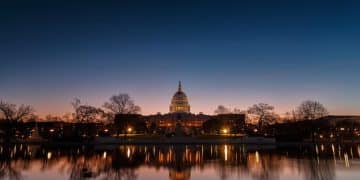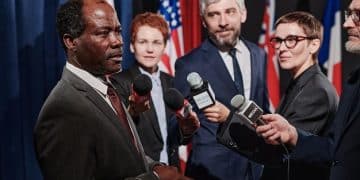Political Figures & Conflicts of Interest: Rules & Enforcement in the US

Political figures navigating conflicts of interest in the US must adhere to updated rules and robust enforcement mechanisms to maintain public trust and ensure ethical governance.
In the United States, the integrity of governance hinges on the ethical conduct of its political figures. Understanding and addressing political figures and conflicts of interest: understanding the updated rules and enforcement mechanisms is crucial for maintaining public trust and ensuring fair governance.
Defining Conflicts of Interest in Politics
A conflict of interest arises when a political figure’s personal interests—financial, familial, or otherwise—could potentially influence their official duties and decisions. Recognizing these conflicts is the first step towards ensuring accountability and transparency in government.
What Constitutes a Conflict of Interest?
A conflict of interest surfaces whenever a public official’s private interests could bias their public actions. This bias could manifest as favoring personal investments, businesses of family members, or even future employment prospects.
The key element is the *potential* for undue influence, even if no unethical behavior actually occurs. The mere appearance of impropriety can erode public trust. Regulations aim to prevent situations where such perceptions can arise.

Types of Conflicts of Interest
Conflicts can be varied and complex. Here are some common types:
- Financial Interests: This includes investments, ownership in companies, and other financial holdings that could be affected by a politician’s decisions.
- Personal Relationships: Family ties or close friendships that might lead to favoritism or biased decision-making.
- Future Employment: Promises or prospects of future jobs that could influence current actions, especially concerning industries or companies the politician oversees.
- Acceptance of Gifts or Favors: Receiving gifts, hospitality, or other favors that could create a sense of obligation or influence decisions.
Effectively addressing conflicts involves stringent reporting requirements, recusal from relevant decisions, and, in some cases, divestment from problematic holdings. Clear guidelines and independent oversight are crucial for enforcing these rules effectively.
Updated Rules Governing Conflicts of Interest
In the US, regulations addressing conflicts of interest have been updated to adapt to evolving political and economic landscapes. These updates aim to close loopholes, enhance transparency, and strengthen enforcement.
Key Legislative Updates
Several legislative acts and amendments have sought to tighten conflict of interest regulations. Examples include revisions to the Ethics in Government Act and the Stop Trading on Congressional Knowledge (STOCK) Act.
The STOCK Act, for instance, explicitly prohibits members of Congress and other government employees from using non-public information for personal gain. It also mandates disclosure of stock trades and other financial transactions.
Changes in Disclosure Requirements
Updated rules often involve more stringent and frequent disclosure requirements. These changes ensure that the public has access to comprehensive information about the financial interests of their representatives.
- Mandatory Reporting of Financial Interests: Politicians must disclose assets, liabilities, and sources of income.
- Real-Time Disclosure: Some jurisdictions now require disclosure of financial transactions within a specific timeframe, increasing transparency.
- Public Accessibility: Reported information must be accessible to the public in an easily searchable format.
These enhanced disclosure mechanisms empower citizens and watchdog groups to scrutinize potential conflicts, promoting accountability and deterring unethical behavior.
Enforcement Mechanisms and Oversight Bodies
Effective rules are only as good as their enforcement. Several oversight bodies and mechanisms play a crucial role in ensuring that conflict of interest regulations are adhered to and that violations are addressed appropriately.

Role of Ethics Committees
Both the House and Senate have ethics committees responsible for investigating allegations of misconduct and recommending appropriate sanctions. These committees play a vital role in holding politicians accountable.
These committees can issue reprimands, censure members, or even recommend expulsion. They also provide guidance to members on ethical conduct and compliance with regulations.
Independent Oversight Agencies
Independent agencies, such as the Office of Government Ethics (OGE), provide oversight and guidance on ethical matters across the executive branch.
- Office of Government Ethics (OGE): Develops and implements ethics policies, provides training, and reviews financial disclosures of executive branch employees.
- Government Accountability Office (GAO): Conducts audits and investigations of government programs and activities, including potential conflicts of interest.
These agencies help ensure that ethical standards are maintained and that potential conflicts are identified and addressed proactively.
Legal Consequences and Penalties
Violations of conflict of interest laws can result in serious legal consequences, including fines, civil penalties, and even criminal charges.
In some cases, politicians may face impeachment or removal from office. The severity of the penalty depends on the nature and extent of the violation, as well as the applicable laws and regulations.
Vigorous enforcement of these penalties sends a strong message that unethical conduct will not be tolerated and helps deter future violations.
Challenges in Identifying and Addressing Conflicts
Despite the existence of rules and enforcement mechanisms, identifying and addressing conflicts of interest remains a challenge. Complex financial arrangements and evolving political norms can make it difficult to detect and prosecute violations.
Complexity of Financial Interests
Politicians often have intricate financial holdings. This complexity can obscure potential conflicts and make it difficult to determine whether a decision was influenced by personal interests.
Shell companies, offshore accounts, and indirect investments can be used to hide assets and obscure the true nature of financial interests. Stronger transparency and investigation powers are needed to uncover these concealed conflicts.
Evolving Political Norms
What constitutes an acceptable or unacceptable conflict can change over time, reflecting evolving social norms and political expectations.
Activities that were once seen as acceptable may now be viewed as unethical. Staying abreast of these evolving norms and updating regulations accordingly is essential for maintaining public trust.
This requires ongoing dialogue and engagement with the public, ethics experts, and policymakers to ensure that ethical standards remain relevant and appropriate.
The Role of Public Awareness and Transparency
Public awareness and transparency are critical components of an effective conflict of interest framework. An informed public is better equipped to hold politicians accountable and demand ethical conduct.
Greater transparency in government operations empowers citizens to monitor potential conflicts and report suspected violations. This transparency also deters politicians from engaging in unethical behavior, knowing that their actions are subject to public scrutiny.
Importance of Investigative Journalism
Investigative journalists play a crucial role in uncovering conflicts of interest and holding politicians accountable. Their work can bring hidden or obscured conflicts to light, prompting investigations and reforms.
Independent journalism is essential for a healthy democracy, providing a check on power and promoting transparency in government. Supporting investigative reporting is crucial for ensuring that conflicts of interest are exposed and addressed effectively.
Empowering Citizen Watchdogs
Citizen watchdog groups also play a vital role in monitoring government activities and advocating for ethical conduct. These groups conduct research, analyze data, and lobby for stronger conflict of interest regulations.
By mobilizing public support and advocating for reforms, citizen watchdogs help create a culture of accountability and transparency in government. Their work is an essential complement to the efforts of oversight bodies and investigative journalists.
Best Practices for Avoiding Conflicts of Interest
Politicians can take proactive steps to avoid conflicts of interest and demonstrate their commitment to ethical conduct. These best practices help foster a culture of integrity and promote public trust.
- Divestment: Sell assets that could create a conflict of interest.
- Recusal: Abstain from participating in decisions where a conflict exists.
- Transparency: Disclose financial interests and potential conflicts proactively.
- Ethics Training: Participate in regular ethics training to stay informed.
By adhering to these best practices, politicians can minimize the risk of conflicts and uphold the highest ethical standards.
Conclusion
Addressing political figures and conflicts of interest: understanding the updated rules and enforcement mechanisms is essential for maintaining the integrity of governance in the US. Strengthening regulations, enhancing enforcement, and promoting public awareness are all crucial steps towards ensuring that political figures act in the public interest.
| Key Point | Brief Description |
|---|---|
| 📜 Updated Rules | Recent updates aim to enhance transparency and enforcement. |
| ⚖️ Enforcement | Ethics committees and agencies oversee and enforce the rules. |
| 📢 Public Awareness | Public awareness and transparency are crucial for accountability. |
| ✅ Best Practices | Divestment, recusal, and transparency help avoid conflicts. |
Frequently Asked Questions
▼
A conflict of interest arises when a political figure’s personal interests could influence their official duties, potentially compromising impartiality.
▼
Key updates include stricter disclosure requirements, prohibitions on using non-public information for personal gain, and enhanced enforcement.
▼
Ethics committees, independent oversight agencies like the OGE, and the justice system share the responsibility of enforcing these regulations.
▼
Challenges include complex financial interests, evolving political norms, and the difficulty of proving undue influence in decision-making processes.
▼
Politicians can avoid conflicts through divestment, recusal from relevant decisions, proactive disclosure, and participation in regular ethics training programs.
Conclusion
In conclusion, navigating the complexities of political figures and conflicts of interest requires a multi-faceted approach, encompassing robust regulations, diligent enforcement, and an informed, engaged public. By prioritizing these elements, the United States can move closer to a government that truly serves the interests of its citizens.





